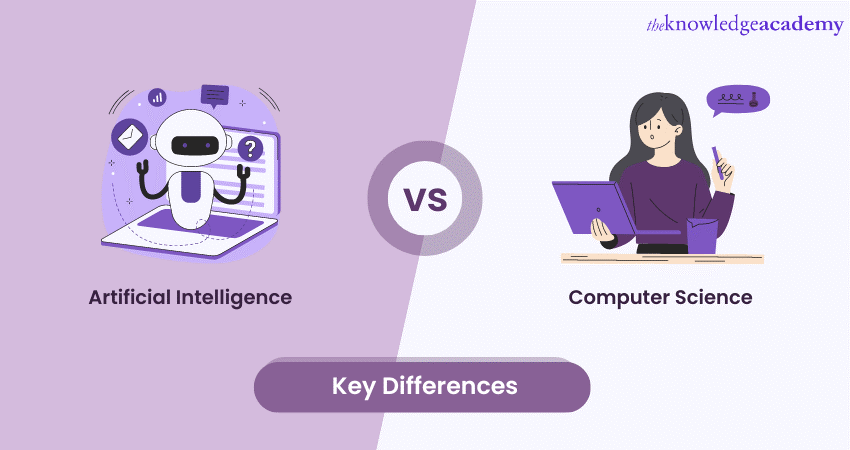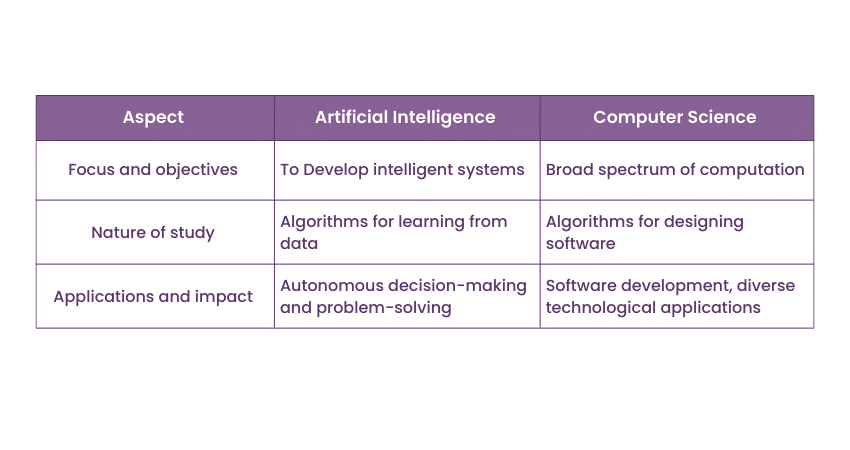We may not have the course you’re looking for. If you enquire or give us a call on 01344203999 and speak to our training experts, we may still be able to help with your training requirements.
Training Outcomes Within Your Budget!
We ensure quality, budget-alignment, and timely delivery by our expert instructors.

Artificial Intelligence and Computer Science are closely related fields that often intersect but have distinct focus areas and expertise. In this blog, we will compare Artificial Intelligence vs. Computer Science, exploring their definition, scope, and interplay. Understanding these differences is paramount for anyone interested in these fields, as they offer exciting opportunities and challenges in the world of technology.
Table of Contents
1) What is Artificial Intelligence?
2) What is Computer Science?
3) Artificial Intelligence vs. Computer Science: What’s the difference?
4) The overlap and interplay of Artificial Intelligence and Computer Science
5) Conclusion
What is Artificial Intelligence?
Artificial Intelligence (AI) stems from the creation of computer systems that mimic human cognitive abilities, enabling them to learn, reason, and make decisions. It involves creating and developing algorithms that allow machines to process data, recognise patterns, and adapt to new situations.
Artificial Intelligence encompasses various applications, from speech recognition and image analysis to autonomous vehicles and virtual assistants. AI aims to enable machines to perform tasks and achieve goals that would typically require human intelligence, opening doors to innovation across industries and transforming the way we interact with technology.
Unleash the full potential of AI with our comprehensive Introduction to Artificial Intelligence Training. Join now!
What is Computer Science?
Computer Science is the study of computation and its practical applications. It explores algorithms, data structures, programming languages, and the underlying principles that drive software development.
Computer Science encompasses various disciplines, including software engineering, Database Management, Networking, and Artificial Intelligence. By understanding how computers work and interact, Computer Science professionals create innovative solutions to complex problems, shaping our digital world today.
Elevate your tech expertise with comprehensive Computer Science and Fundamentals Training—sign up now for a brighter technological future!
Artificial Intelligence vs. Computer Science: What’s the difference?
Computer Science and Artificial Intelligence share a strong connection, yet they diverge in key aspects, including their focus, nature of study, and applications. Understanding these differences sheds light on each field's unique contributions to the world of technology.

Focus and objectives
The primary focus of Artificial Intelligence is to develop systems that can simulate human intelligence. AI aims to create independent machines that can think, reason, learn, and make decisions based on data and patterns. The goal is to achieve automation and autonomy that were once considered exclusive to human intelligence.
Computer Science encompasses a broader spectrum of computation and software development topics. While it does contribute to AI research, its focus extends beyond intelligent systems. Computer Science deals with algorithms, data structures, programming languages, and the design of efficient software systems.
Nature of study
The study of Artificial Intelligence involves delving into algorithms that enable machines to learn and process information from data. Machine Learning algorithms, for instance, enable computers to improve their performance through experience. AI Researchers work on developing these algorithms and creating models that can understand and adapt to various scenarios.
Computer Science covers various subjects, including Algorithm Design, Software Engineering, and System Architecture. It encompasses both the theoretical and practical aspects of computation, aiming to solve diverse computational problems beyond just AI-related challenges.
Applications and impact
Artificial Intelligence applications are centred around creating systems to make decisions and perform tasks autonomously. Examples of AI applications are self-driving cars, virtual assistants, fraud detection systems, and recommendation engines. The impact of AI is felt across industries as it transforms how businesses operate and individuals interact with technology.
Computer Science applications extend beyond AI to encompass Software Development, Networking, Cybersecurity, Database Management, and more. Software Engineers design and build applications, Programmers create code to solve problems, and Network Specialists ensure seamless communication between devices.
The key differences between Artificial Intelligence and Computer Science underscore their distinct roles and contributions within the technology landscape. AI focuses on creating intelligent systems, whereas Computer Science provides the foundational knowledge and tools that empower AI development and drive advancements in various computing domains.
The overlap and interplay of Artificial Intelligence and Computer Science
The intricate relationship between Artificial Intelligence and Computer Science lies at the heart of technological advancement. While they are distinct fields, their interplay is undeniable, leading to mutual growth and innovation.
AI's dependence on Computer Science
Artificial Intelligence’s progress is intricately woven with the foundations of Computer Science. The algorithms, data structures, and computational theories developed within Computer Science provide the building blocks for AI systems. Machine Learning, a cornerstone of AI, relies on mathematical concepts rooted in Computer Science to create models that can learn patterns from data. Without the tools and methodologies derived from Computer Science, the evolution of AI would lack the robustness and efficiency it is known for today.
AI advancements shaping Computer Science
The rise of Artificial Intelligence technologies has catalysed new directions within Computer Science. The challenges posed by AI applications have spurred innovations in distributed computing, Big Data processing, and ethics in technology. The demand for handling massive datasets efficiently has led to the development of advanced data processing techniques and distributed computing architectures.
Additionally, the ethical considerations surrounding Artificial Intelligence have prompted Computer Scientists to explore the societal implications of technology, sparking discussions about responsible AI development and deployment.
Artificial Intelligence and Computer Science interplay is a dynamic cycle of influence. As AI pushes the boundaries of what's possible, it stimulates Computer Science to evolve and adapt, producing novel methodologies and frameworks that, in turn, fuel the growth of AI.
Conclusion
To sum it up, though the distinction between Artificial Intelligence and Computer Science is clear – their synergy is undeniable. Computer Science's tools underpin AI's quest for intelligence, while AI's advancements propel Computer Science's evolution. Embracing their differences and harnessing their interplay opens doors to innovation, shaping a future where intelligent systems and computational excellence coexist harmoniously.
Unlock your full potential with our extensive Personal Development Training Courses. Join today!
Frequently Asked Questions
Upcoming Data, Analytics & AI Resources Batches & Dates
Date
 Introduction to AI Course
Introduction to AI Course
Fri 24th Jan 2025
Fri 28th Mar 2025
Fri 23rd May 2025
Fri 25th Jul 2025
Fri 26th Sep 2025
Fri 28th Nov 2025







 Top Rated Course
Top Rated Course



 If you wish to make any changes to your course, please
If you wish to make any changes to your course, please


